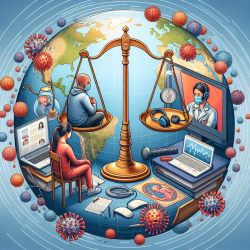In the ever-evolving landscape of global health, practitioners are often faced with the challenge of balancing ethical considerations with practical needs. The research article "Global health and national borders: the ethics of foreign aid in a time of financial crisis" provides a comprehensive analysis of these issues, offering valuable insights that can enhance practitioner skills and encourage further research.
Understanding Ethical Frameworks
The article reviews four influential theories of justice—consequentialist, relational, human rights, and social contract approaches. Each framework offers unique perspectives on international assistance and the ethical responsibilities of donor nations. Understanding these frameworks can help practitioners develop a more nuanced approach to global health issues.
- Consequentialist Approach: This theory emphasizes outcomes and suggests that practitioners should focus on interventions that maximize beneficial outcomes for the global poor.
- Relational Approach: This perspective highlights the importance of relationships and suggests that practitioners consider the broader social context when addressing health disparities.
- Human Rights Approach: This framework underscores the importance of basic rights such as subsistence and security, urging practitioners to advocate for policies that protect these rights.
- Social Contract Approach: This theory focuses on collective agreements and suggests that practitioners work towards creating just political arrangements that support global health initiatives.
Implementing Research Outcomes in Practice
Practitioners can enhance their skills by integrating the insights from these ethical frameworks into their practice. Here are some strategies:
- Cultural Competency: Develop a deep understanding of the cultural contexts in which you operate. This will help you tailor interventions to meet the unique needs of different populations.
- Advocacy: Use your platform to advocate for policies that align with ethical frameworks, such as supporting international development assistance for health (DAH).
- Collaboration: Engage with international agencies and voluntary health organizations to strengthen partnerships and leverage resources for global health initiatives.
- Continuous Learning: Stay informed about global health trends and ethical debates through conferences, publications, and webinars.
The Importance of Further Research
The research article encourages further exploration into the ethical dimensions of global health. Practitioners should consider conducting their own research or collaborating with academic institutions to deepen their understanding of these issues. By doing so, they can contribute to a more equitable global health landscape.
Conclusion
The intersection of ethics and global health presents both challenges and opportunities for practitioners. By embracing the insights from "Global health and national borders: the ethics of foreign aid in a time of financial crisis," practitioners can enhance their skills, advocate for meaningful change, and contribute to a more just world.
To read the original research paper, please follow this link: Global health and national borders: the ethics of foreign aid in a time of financial crisis.










